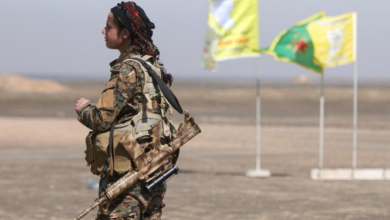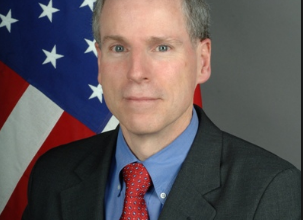
An independent Kurdistan? Be careful what you wish for
Let’s imagine a world where the long-supported Kurdistan came to being in the Middle East, in a place between Turkey, Syria, Iran and Iraq. That’s right: Kurdistan would need to be carved out of four sovereign countries. Looking at the status quo, this doesn’t look likely to happen. However, as a thought experiment, let’s imagine a Middle East with a Kurdish state.
Of late, the idea of a Great Kurdistan is being pushed in the Western press and on social media. Because of the one-sided propaganda, many people came to believe if there was a Kurdistan in the Middle East, it would be a close ally for the EU, the U.S. and Israel. Some analysts’ depiction of a Great Kurdistan resembles an ultra-secular Jordan or an Israel minus the Arab-Israel tensions. For such a project to be successful, it has to be realistic, historically and intellectually robust. We already have plenty of half-baked countries in the Middle East cooked up by European colonizers on a Sunday afternoon.
No man is an island
Ethnically, Kurds are populated in Iraq, Iran, Syria and Turkey. Therefore our dreamland of Great Kurdistan would be established in the middle of this tetragon, otherwise known as the most complicated region in the world. Even if we imagine a Kurdistan was founded as a result of the power vacuum at the end of Iraq’s post-war conflicts, the Arab Spring and the Syrian civil war, this new state would not be able to exist for long because its rich oil resources would bring regional and global vultures that would possess the land and resources, instead of the Kurds. In practice, we have seen how ISIS alone was enough to wipe out almost all PKK/PYD from Kobane or areas in Kirkuk.
It is a terrible mistake to frame the battle against ISIS as either supporting the PKK or not
Ceylan Ozbudak
After breaking away from the Ottoman Empire, the Arab states had no expertise in warfare, no settled armies, no ideological ground for statehood and no institutions in place. Therefore, all easily became colonies of the Western powers. The same fate will meet a baby Kurdistan in the Middle East.
Sociological difficulties and realities on the ground
Yes, nationalist Kurds campaign loudly around the world for a Kurdistan, but not all Kurds want to live in a state exclusive to them. Apart from Turkey, Iraq, Syria and Iran, large groups of Kurds live in Lebanon, Armenia, Azerbaijan, Germany, and other places across Europe, the U.S., Canada and Australia. One fifth of Kurds in the world are Shiite Muslims, the majority is Sunni Muslim and others consist of Yazidis and Christians, among other. Such a diverse sociological base is difficult to maneuver and mobilize.
Even if we assume the majority of the world’s Kurds agreed to live in Kurdistan, it would be extremely difficult to institutionalize a national program due to such a diverse society with little historical experience in living together. Then there is language: Kurds have never had a nation state, thus no institutionalized language use or coherence of one language through an education system. Our Kurdish brothers speak different dialects, merged with the languages of the region they live in. There is no single Kurdish language on which institutions can easily emerge. Rabid nationalism is not enough. That experiment has failed time and again across the Middle East.
Threat for the Western allies
Despite these difficulties, if we looked at the idea of Great Kurdistan with sympathy thinking this is the result of a nation’s will of building its own sphere, the flag bearer of the Kurdistan idea today is the PKK, a communist-Leninist organization.
Therefore, a Kurdistan in the Middle East could naturally be communist. Just like PYD (the Syrian branch of the PKK)leaves no room for other political groups to exist in the cantons in Northern Syria, no other political party can exist in a PKK-led Kurdistan. The new Kurdistan would resemble nothing other than a new North Korea or Laos in the Levant. Like all communist groups, PKK is also well documented for its brutality against the dissent. PKK leader Abdullah Ocalan is known by many as “the baby killer” in Turkish public opinion, not because of the babies he allegedly killed in Turkish villages, but in the Kurdish villages.
Make no mistake about it: The PKK threat is not directed toward Turkey alone. It’s worth remembering that the PKK is on the list of terrorist organizations in America and the EU for good reason. A Marxist, terrorist autonomous state would spell the end of the religious Middle East. It would be especially disastrous for Israel, a country founded on religion. Marxist dictators of the Baath Party opposed Israel for ideological reasons. This norm in the Arab world is not because of religion, but politics. Gamal Abdel Nasser, who took power in Egypt in 1952, was seen as embodying the aspirations of the pan-Arab citizens of the region. In the pan-Arabist ideology, apart from the matter of Arab identity, the principle, which united the citizens of these newly independent nations, was opposition to the State of Israel. This message was used by Baathist regimes as an excuse to effectively subordinate all other concerns in the public, including any attempts at local political reform or economic development. This same approach will apply in the supposed Kurdistan as soon as such a state is established. Due to ideological dissent, a Marxist-communist Kurdistan would be the primary enemy of the capitalist Western nations.
It is a terrible mistake to frame the battle against ISIS as either supporting the PKK or not. Cutting deals with the PKK to defeat ISIS is not only short-sighted, but guaranteed to fail because communist zeal cannot defeat global jihadist zeal. We can take away the oxygen of jihadists in Syria by removing their main grievances and countering their narrative. If we want the protection and prosperity of the peoples of the Middle East, what we need to accomplish is not a communist Kurdistan, but a united Middle East.
alarabiya.net



